七年级英语下册师大版Unit 5 Now and Then Lesson 13 Changes in Our Town 2课件(51张ppt)
文档属性
| 名称 | 七年级英语下册师大版Unit 5 Now and Then Lesson 13 Changes in Our Town 2课件(51张ppt) |
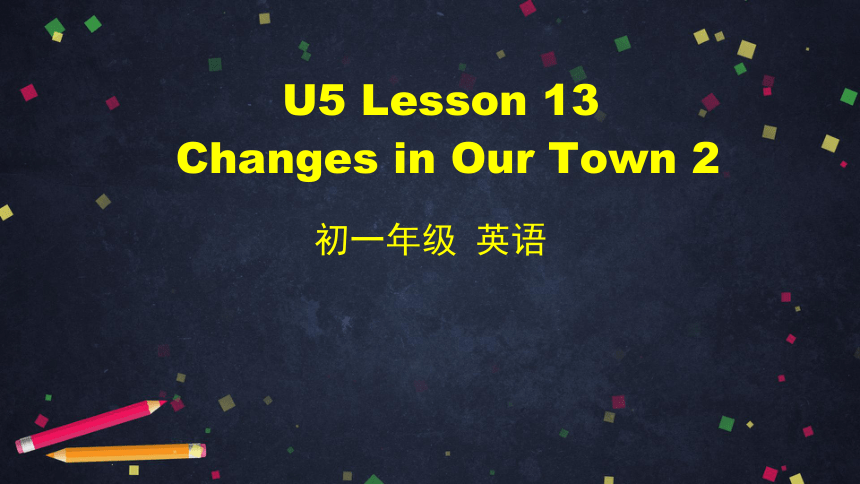
|
|
| 格式 | zip | ||
| 文件大小 | 5.6MB | ||
| 资源类型 | 教案 | ||
| 版本资源 | 北师大版 | ||
| 科目 | 英语 | ||
| 更新时间 | 2020-06-08 20:44:44 | ||
图片预览


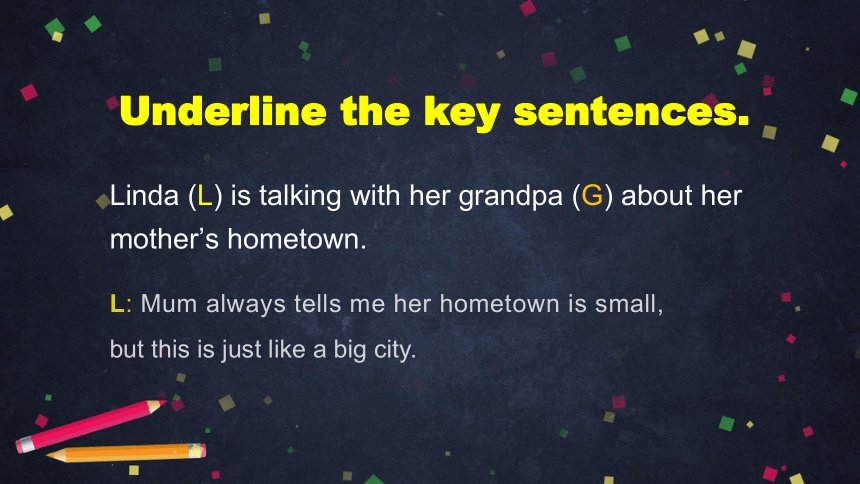
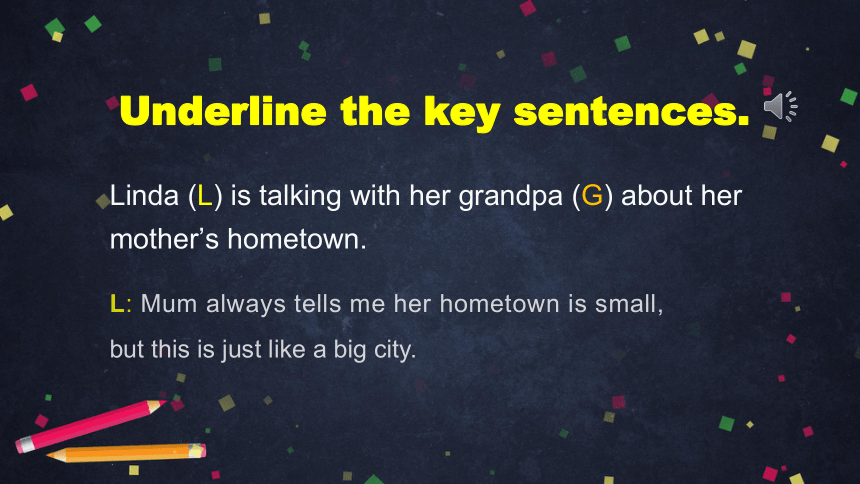
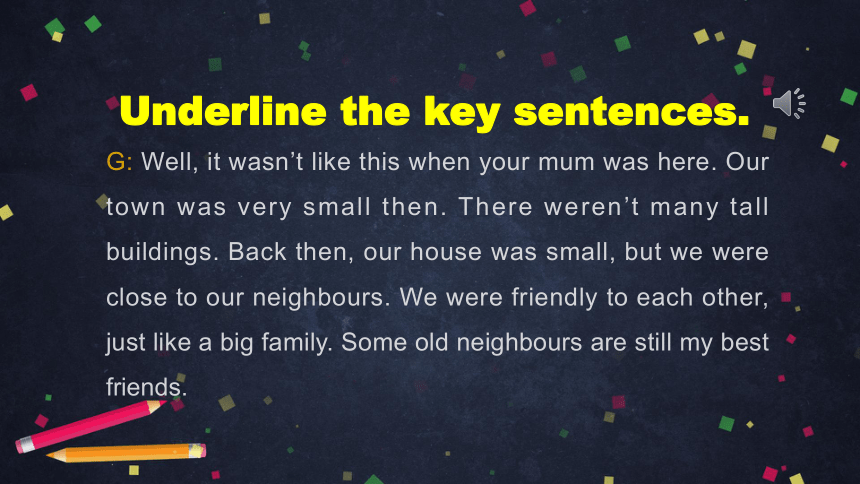
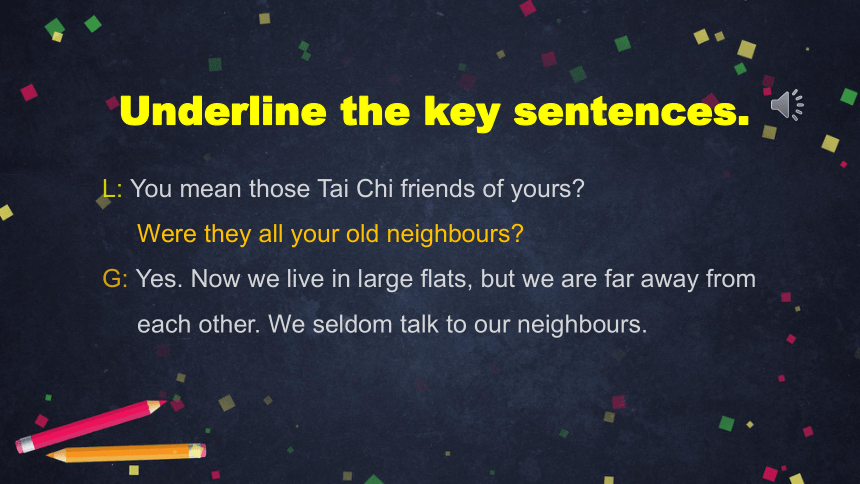

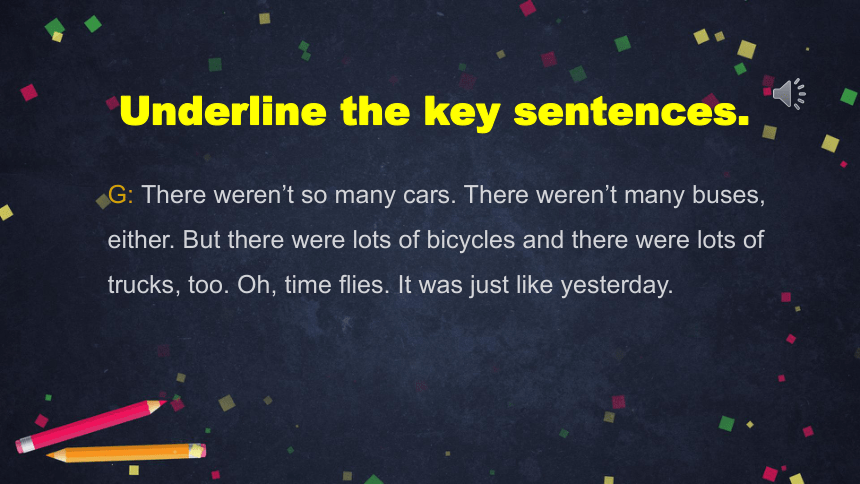
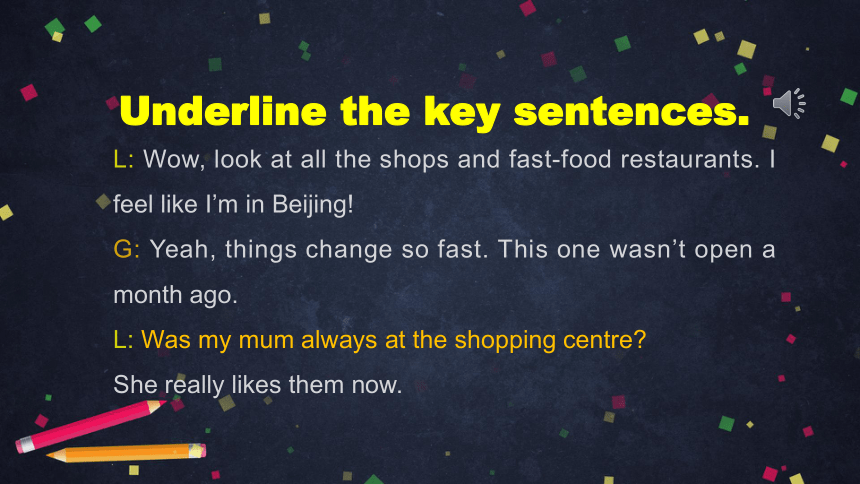
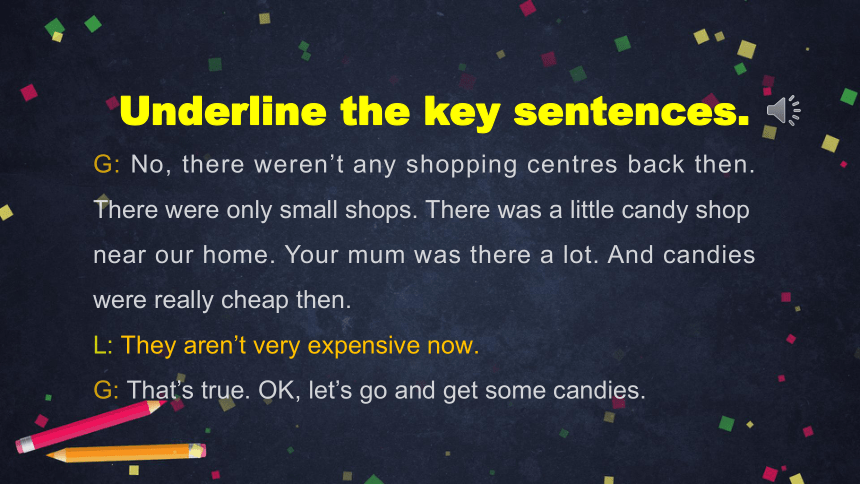
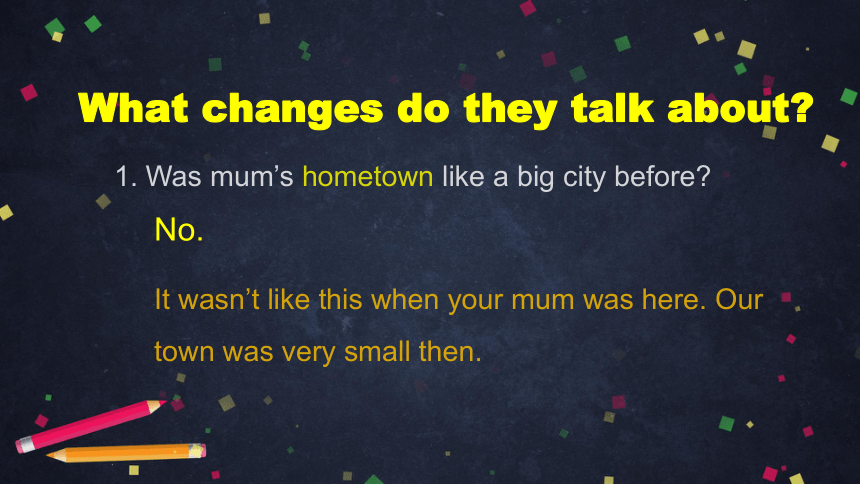

文档简介
(共51张PPT)
U5
Lesson
13
Changes
in
Our
Town
2
初一年级
英语
What
changes
do
they
talk
about?
1.
Was
mum’s
hometown
like
a
big
city
before?
2.
What
were
Grandpa’s
neighbours
like?
3.
What
was
the
traffic
like?
4.
Was
mum
always
at
the
shopping
centre?
Underline
the
key
sentences.
L:
Mum
always
tells
me
her
hometown
is
small,
but
this
is
just
like
a
big
city.
Linda
(L)
is
talking
with
her
grandpa
(G)
about
her
mother’s
hometown.
L:
Mum
always
tells
me
her
hometown
is
small,
but
this
is
just
like
a
big
city.
Linda
(L)
is
talking
with
her
grandpa
(G)
about
her
mother’s
hometown.
Underline
the
key
sentences.
G:
Well,
it
wasn’t
like
this
when
your
mum
was
here.
Our
town
was
very
small
then.
There
weren’t
many
tall
buildings.
Back
then,
our
house
was
small,
but
we
were
close
to
our
neighbours.
We
were
friendly
to
each
other,
just
like
a
big
family.
Some
old
neighbours
are
still
my
best
friends.
Underline
the
key
sentences.
L:
You
mean
those
Tai
Chi
friends
of
yours?
Were
they
all
your
old
neighbours?
G:
Yes.
Now
we
live
in
large
flats,
but
we
are
far
away
from
each
other.
We
seldom
talk
to
our
neighbours.
Underline
the
key
sentences.
L:
But
it’s
easy
to
travel
around
the
town,
right?
There
are
so
many
buses
and
taxis.
G:
Not
really.
Look
at
the
traffic.
It’s
so
bad!
L:
What
was
the
traffic
like
before?
Was
it
good
then?
Underline
the
key
sentences.
G:
There
weren’t
so
many
cars.
There
weren’t
many
buses,
either.
But
there
were
lots
of
bicycles
and
there
were
lots
of
trucks,
too.
Oh,
time
flies.
It
was
just
like
yesterday.
Underline
the
key
sentences.
L:
Wow,
look
at
all
the
shops
and
fast-food
restaurants.
I
feel
like
I’m
in
Beijing!
G:
Yeah,
things
change
so
fast.
This
one
wasn’t
open
a
month
ago.
L:
Was
my
mum
always
at
the
shopping
centre?
She
really
likes
them
now.
Underline
the
key
sentences.
G:
No,
there
weren’t
any
shopping
centres
back
then.
There
were
only
small
shops.
There
was
a
little
candy
shop
near
our
home.
Your
mum
was
there
a
lot.
And
candies
were
really
cheap
then.
L:
They
aren’t
very
expensive
now.
G:
That’s
true.
OK,
let’s
go
and
get
some
candies.
Underline
the
key
sentences.
1.
Was
mum’s
hometown
like
a
big
city
before?
It
wasn’t
like
this
when
your
mum
was
here.
Our
town
was
very
small
then.
No.
What
changes
do
they
talk
about?
2.
What
were
Grandpa’s
neighbours
like?
They
were
close
and
friendly,
like
a
big
family.
We
were
close
to
our
neighbours.
We
were
friendly
to
each
other,
just
like
a
big
family.
What
changes
do
they
talk
about?
3.
What
was
the
traffic
like?
There
weren’t
so
many
cars.
There
weren’t
many
buses,
either.
But
there
were
lots
of
bicycles
and
there
were
lots
of
trucks,
too.
What
changes
do
they
talk
about?
4.
Was
mum
always
at
the
shopping
centre?
There
weren’t
any
shopping
centres
back
then.
There
were
only
small
shops.
There
was
a
little
candy
shop
near
our
home.
Your
mum
was
there
a
lot.
No.
What
changes
do
they
talk
about?
1.
Our
town
was
very
small
then.
2.
We
were
close
to
our
neighbours.
We
were
friendly
to
each
other.
Our
town
1
very
small
then.
We
2
friendly
to
each
other.
Activity
6.
Complete
the
table
with
was
or
were.
肯定句
was
were
3.
There
were
lots
of
bicycles
and
there
were
lots
of
trucks,
too.
4.
There
was
a
little
candy
shop
near
our
home.
1.
It
wasn’t
like
this
when
your
mum
was
here.
2.
There
weren’t
so
many
cars.
There
weren’t
many
buses,
either.
3.
There
weren’t
any
shopping
centres
back
then.
There
3
many
tall
buildings.
It
4
like
this
before.
Activity
6.
Complete
the
table
with
was
not
(wasn’t)
or
were
not
(weren’t).
否定句
weren’t
wasn’t
1.
There
were
lots
of
bicycles
and
there
were
lots
of
trucks,
too.
2.
There
weren’t
so
many
cars.
There
weren’t
many
buses,
either.
Activity
5.
Complete
the
sentences
with
too
or
either.
There
were
lots
of
trucks,
too.
There
weren’t
many
buses,
either.
1.It
was
sunny.
It
was
cool,
.
2.We
can’t
bring
our
bikes,
.
too
either
Please
complete
the
sentences
with
too
or
either.
1.The
things
in
the
shops
are
cheap,
.
2.
He
doesn’t
like
big
cities,
.
3.
There
isn’t
a
lot
of
traffic,
.
4.
I
live
in
a
small
town,
.
5.
I’m
close
to
my
grandma,
.
too
either
too
too
either
1.
Were
they
all
your
old
neighbours?
2.
Was
my
mum
always
at
the
shopping
centre?
My
mum
was
always
at
the
shopping
centre.
They
were
all
your
old
neighbours.
There
was
a
little
candy
shop
near
our
home.
3.
Was
there
a
little
candy
shop
near
our
home?
4.
Were
there
lots
of
bicycles?
There
were
lots
of
bicycles.
5
my
mum
there
a
lot?
6
they
all
your
old
neighbours?
Activity
6.
Complete
the
table
with
was
or
were.
一般疑问句
Was
Were
Yes,
she
was.
No,
she
wasn’t.
Yes,
they
were.
No,
they
weren’t.
1.
What
was
the
traffic
like?
2.
What
were
Grandpa’s
neighbours
like?
What
7
the
traffic
like
before?
What
8
Grandpa’s
neighbours
like?
Activity
6.
Complete
the
table
with
was
or
were.
特殊疑问句
was
were
Activity
7.
Write
questions
about
the
town.
1.
what
/
the
town
/
like
/
was
2.
there
/
lots
of
bicycles
/
were
3.
any
/
shopping
centres
/
there
/
were
4.
tall
buildings
/
were
/
many
/
there
1.
what
/
the
town
/
like
/
was
What
was
the
town
like?
Activity
7.
Write
questions
about
the
town.
2.
there
/
lots
of
bicycles
/
were
Were
there
lots
of
bicycles?
Activity
7.
Write
questions
about
the
town.
3.
any
/
shopping
centres
/
there
/
were
Were
there
any
shopping
centres?
Activity
7.
Write
questions
about
the
town.
4.
tall
buildings
/
were
/
many
/
there
Were
there
many
tall
buildings?
Activity
7.
Write
questions
about
the
town.
Activity
7.
Please
ask
and
answer
the
questions
in
pairs.
1.
What
was
the
town
like?
The
town
was
very
small.
Activity
7.
Please
ask
and
answer
the
questions
in
pairs.
2.
Were
there
lots
of
bicycles?
Yes,
there
were.
Activity
7.
Please
ask
and
answer
the
questions
in
pairs.
3.
Were
there
any
shopping
centres?
No,
there
weren’t.
Activity
7.
Please
ask
and
answer
the
questions
in
pairs.
4.
Were
there
many
tall
buildings?
No,
there
weren’t.
Activity
8.
Where
were
you
at
these
times
yesterday?
7:30
am
2:30
pm
8:30
pm
Activity
8.
Where
were
you
at
these
times
yesterday?
2:30
pm
At
7:30
yesterday
morning,
I
was
at
a
shop.
7:30
am
8:30
pm
At
2:30
yesterday
afternoon,
I
was
at
my
friend’s.
At
8:30
yesterday
evening,
I
was
at
home.
Activity
9.
Ask
and
answer
in
pairs.
Talk
about
where
you
were
yesterday?
A:
Where
were
you
at
7:30
yesterday
morning?
B:
I
was
in
the
kitchen.
How
about
you?
A:
I
was
at
school.
Example:
Activity
10.
Complete
the
table
with
three
facts
about
your
town.
My
town
Five
years
ago
Now
Lily’s
town
Five
years
ago
Now
lots
of
cars
not
so
many
cars
many
tall
buildings
not
many
tall
buildings
many
shopping
centres
only
small
shops
Please
talk
in
pairs.
A:
Were
there
many
cars
before?
B:
No,
but
there
are
lots
of
cars
now.
Five
years
ago
Now
lots
of
cars
not
so
many
cars
many
tall
buildings
not
many
tall
buildings
many
shopping
centres
only
small
shops
Pronunciation:
/i?/,
/e?/
Activity
11.
Listen
and
complete
the
words
with
ear,
ere,
air
or
are.
Be
c
ful!
I
can
h
a
b
.
Wh
is
it?
It’s
out
th
.
Can
you
h
it?
I
think
it’s
coming
in
h
.
Quick!
Run
up
the
st
s!
Pronunciation:
/i?/,
/e?/
Activity
11.
Listen
and
complete
the
words
with
ear,
ere,
air
or
are.
Be
c
ful!
I
can
h
a
b
.
Wh
is
it?
It’s
out
th
.
Can
you
h
it?
I
think
it’s
coming
in
h
.
Quick!
Run
up
the
st
s!
are
ear
ear
ere
ere
ear
ere
air
Pronunciation:
/i?/,
/e?/
careful
hear
bear
where
there
here
stairs
Pronunciation:
/i?/,
/e?/
careful
hear
bear
where
there
here
stairs
/i?/
/e?/
hair
clear
fair
fear
ear
wear
/i?/
Can
you
give
more
examples?
/e?/
Pronunciation:
/i?/,
/e?/
Activity
11.
Please
listen
and
read
aloud.
Be
c
ful!
I
can
h
a
b
.
Wh
is
it?
It’s
out
th
.
Can
you
h
it?
I
think
it’s
coming
in
h
.
Quick!
Run
up
the
st
s!
are
ear
ear
ere
ere
ear
ere
air
What
have
you
learned?
学习了be动词一般过去时的肯定句、否定句、一般疑问句和特殊疑问句的结构。
使用was
和
were介绍家乡过去状态。
学习并能读出/i?/
和
/e?/的发音,了解了字母组合ear,
ere,
air以及are的发音。
Homework
1.
Do
Workbook
Page
94,
Exercise
1&
2.
2.
Read
with
the
recording
about
/i?/&
/e?/
sound.
Thank
you
U5
Lesson
13
Changes
in
Our
Town
2
初一年级
英语
What
changes
do
they
talk
about?
1.
Was
mum’s
hometown
like
a
big
city
before?
2.
What
were
Grandpa’s
neighbours
like?
3.
What
was
the
traffic
like?
4.
Was
mum
always
at
the
shopping
centre?
Underline
the
key
sentences.
L:
Mum
always
tells
me
her
hometown
is
small,
but
this
is
just
like
a
big
city.
Linda
(L)
is
talking
with
her
grandpa
(G)
about
her
mother’s
hometown.
L:
Mum
always
tells
me
her
hometown
is
small,
but
this
is
just
like
a
big
city.
Linda
(L)
is
talking
with
her
grandpa
(G)
about
her
mother’s
hometown.
Underline
the
key
sentences.
G:
Well,
it
wasn’t
like
this
when
your
mum
was
here.
Our
town
was
very
small
then.
There
weren’t
many
tall
buildings.
Back
then,
our
house
was
small,
but
we
were
close
to
our
neighbours.
We
were
friendly
to
each
other,
just
like
a
big
family.
Some
old
neighbours
are
still
my
best
friends.
Underline
the
key
sentences.
L:
You
mean
those
Tai
Chi
friends
of
yours?
Were
they
all
your
old
neighbours?
G:
Yes.
Now
we
live
in
large
flats,
but
we
are
far
away
from
each
other.
We
seldom
talk
to
our
neighbours.
Underline
the
key
sentences.
L:
But
it’s
easy
to
travel
around
the
town,
right?
There
are
so
many
buses
and
taxis.
G:
Not
really.
Look
at
the
traffic.
It’s
so
bad!
L:
What
was
the
traffic
like
before?
Was
it
good
then?
Underline
the
key
sentences.
G:
There
weren’t
so
many
cars.
There
weren’t
many
buses,
either.
But
there
were
lots
of
bicycles
and
there
were
lots
of
trucks,
too.
Oh,
time
flies.
It
was
just
like
yesterday.
Underline
the
key
sentences.
L:
Wow,
look
at
all
the
shops
and
fast-food
restaurants.
I
feel
like
I’m
in
Beijing!
G:
Yeah,
things
change
so
fast.
This
one
wasn’t
open
a
month
ago.
L:
Was
my
mum
always
at
the
shopping
centre?
She
really
likes
them
now.
Underline
the
key
sentences.
G:
No,
there
weren’t
any
shopping
centres
back
then.
There
were
only
small
shops.
There
was
a
little
candy
shop
near
our
home.
Your
mum
was
there
a
lot.
And
candies
were
really
cheap
then.
L:
They
aren’t
very
expensive
now.
G:
That’s
true.
OK,
let’s
go
and
get
some
candies.
Underline
the
key
sentences.
1.
Was
mum’s
hometown
like
a
big
city
before?
It
wasn’t
like
this
when
your
mum
was
here.
Our
town
was
very
small
then.
No.
What
changes
do
they
talk
about?
2.
What
were
Grandpa’s
neighbours
like?
They
were
close
and
friendly,
like
a
big
family.
We
were
close
to
our
neighbours.
We
were
friendly
to
each
other,
just
like
a
big
family.
What
changes
do
they
talk
about?
3.
What
was
the
traffic
like?
There
weren’t
so
many
cars.
There
weren’t
many
buses,
either.
But
there
were
lots
of
bicycles
and
there
were
lots
of
trucks,
too.
What
changes
do
they
talk
about?
4.
Was
mum
always
at
the
shopping
centre?
There
weren’t
any
shopping
centres
back
then.
There
were
only
small
shops.
There
was
a
little
candy
shop
near
our
home.
Your
mum
was
there
a
lot.
No.
What
changes
do
they
talk
about?
1.
Our
town
was
very
small
then.
2.
We
were
close
to
our
neighbours.
We
were
friendly
to
each
other.
Our
town
1
very
small
then.
We
2
friendly
to
each
other.
Activity
6.
Complete
the
table
with
was
or
were.
肯定句
was
were
3.
There
were
lots
of
bicycles
and
there
were
lots
of
trucks,
too.
4.
There
was
a
little
candy
shop
near
our
home.
1.
It
wasn’t
like
this
when
your
mum
was
here.
2.
There
weren’t
so
many
cars.
There
weren’t
many
buses,
either.
3.
There
weren’t
any
shopping
centres
back
then.
There
3
many
tall
buildings.
It
4
like
this
before.
Activity
6.
Complete
the
table
with
was
not
(wasn’t)
or
were
not
(weren’t).
否定句
weren’t
wasn’t
1.
There
were
lots
of
bicycles
and
there
were
lots
of
trucks,
too.
2.
There
weren’t
so
many
cars.
There
weren’t
many
buses,
either.
Activity
5.
Complete
the
sentences
with
too
or
either.
There
were
lots
of
trucks,
too.
There
weren’t
many
buses,
either.
1.It
was
sunny.
It
was
cool,
.
2.We
can’t
bring
our
bikes,
.
too
either
Please
complete
the
sentences
with
too
or
either.
1.The
things
in
the
shops
are
cheap,
.
2.
He
doesn’t
like
big
cities,
.
3.
There
isn’t
a
lot
of
traffic,
.
4.
I
live
in
a
small
town,
.
5.
I’m
close
to
my
grandma,
.
too
either
too
too
either
1.
Were
they
all
your
old
neighbours?
2.
Was
my
mum
always
at
the
shopping
centre?
My
mum
was
always
at
the
shopping
centre.
They
were
all
your
old
neighbours.
There
was
a
little
candy
shop
near
our
home.
3.
Was
there
a
little
candy
shop
near
our
home?
4.
Were
there
lots
of
bicycles?
There
were
lots
of
bicycles.
5
my
mum
there
a
lot?
6
they
all
your
old
neighbours?
Activity
6.
Complete
the
table
with
was
or
were.
一般疑问句
Was
Were
Yes,
she
was.
No,
she
wasn’t.
Yes,
they
were.
No,
they
weren’t.
1.
What
was
the
traffic
like?
2.
What
were
Grandpa’s
neighbours
like?
What
7
the
traffic
like
before?
What
8
Grandpa’s
neighbours
like?
Activity
6.
Complete
the
table
with
was
or
were.
特殊疑问句
was
were
Activity
7.
Write
questions
about
the
town.
1.
what
/
the
town
/
like
/
was
2.
there
/
lots
of
bicycles
/
were
3.
any
/
shopping
centres
/
there
/
were
4.
tall
buildings
/
were
/
many
/
there
1.
what
/
the
town
/
like
/
was
What
was
the
town
like?
Activity
7.
Write
questions
about
the
town.
2.
there
/
lots
of
bicycles
/
were
Were
there
lots
of
bicycles?
Activity
7.
Write
questions
about
the
town.
3.
any
/
shopping
centres
/
there
/
were
Were
there
any
shopping
centres?
Activity
7.
Write
questions
about
the
town.
4.
tall
buildings
/
were
/
many
/
there
Were
there
many
tall
buildings?
Activity
7.
Write
questions
about
the
town.
Activity
7.
Please
ask
and
answer
the
questions
in
pairs.
1.
What
was
the
town
like?
The
town
was
very
small.
Activity
7.
Please
ask
and
answer
the
questions
in
pairs.
2.
Were
there
lots
of
bicycles?
Yes,
there
were.
Activity
7.
Please
ask
and
answer
the
questions
in
pairs.
3.
Were
there
any
shopping
centres?
No,
there
weren’t.
Activity
7.
Please
ask
and
answer
the
questions
in
pairs.
4.
Were
there
many
tall
buildings?
No,
there
weren’t.
Activity
8.
Where
were
you
at
these
times
yesterday?
7:30
am
2:30
pm
8:30
pm
Activity
8.
Where
were
you
at
these
times
yesterday?
2:30
pm
At
7:30
yesterday
morning,
I
was
at
a
shop.
7:30
am
8:30
pm
At
2:30
yesterday
afternoon,
I
was
at
my
friend’s.
At
8:30
yesterday
evening,
I
was
at
home.
Activity
9.
Ask
and
answer
in
pairs.
Talk
about
where
you
were
yesterday?
A:
Where
were
you
at
7:30
yesterday
morning?
B:
I
was
in
the
kitchen.
How
about
you?
A:
I
was
at
school.
Example:
Activity
10.
Complete
the
table
with
three
facts
about
your
town.
My
town
Five
years
ago
Now
Lily’s
town
Five
years
ago
Now
lots
of
cars
not
so
many
cars
many
tall
buildings
not
many
tall
buildings
many
shopping
centres
only
small
shops
Please
talk
in
pairs.
A:
Were
there
many
cars
before?
B:
No,
but
there
are
lots
of
cars
now.
Five
years
ago
Now
lots
of
cars
not
so
many
cars
many
tall
buildings
not
many
tall
buildings
many
shopping
centres
only
small
shops
Pronunciation:
/i?/,
/e?/
Activity
11.
Listen
and
complete
the
words
with
ear,
ere,
air
or
are.
Be
c
ful!
I
can
h
a
b
.
Wh
is
it?
It’s
out
th
.
Can
you
h
it?
I
think
it’s
coming
in
h
.
Quick!
Run
up
the
st
s!
Pronunciation:
/i?/,
/e?/
Activity
11.
Listen
and
complete
the
words
with
ear,
ere,
air
or
are.
Be
c
ful!
I
can
h
a
b
.
Wh
is
it?
It’s
out
th
.
Can
you
h
it?
I
think
it’s
coming
in
h
.
Quick!
Run
up
the
st
s!
are
ear
ear
ere
ere
ear
ere
air
Pronunciation:
/i?/,
/e?/
careful
hear
bear
where
there
here
stairs
Pronunciation:
/i?/,
/e?/
careful
hear
bear
where
there
here
stairs
/i?/
/e?/
hair
clear
fair
fear
ear
wear
/i?/
Can
you
give
more
examples?
/e?/
Pronunciation:
/i?/,
/e?/
Activity
11.
Please
listen
and
read
aloud.
Be
c
ful!
I
can
h
a
b
.
Wh
is
it?
It’s
out
th
.
Can
you
h
it?
I
think
it’s
coming
in
h
.
Quick!
Run
up
the
st
s!
are
ear
ear
ere
ere
ear
ere
air
What
have
you
learned?
学习了be动词一般过去时的肯定句、否定句、一般疑问句和特殊疑问句的结构。
使用was
和
were介绍家乡过去状态。
学习并能读出/i?/
和
/e?/的发音,了解了字母组合ear,
ere,
air以及are的发音。
Homework
1.
Do
Workbook
Page
94,
Exercise
1&
2.
2.
Read
with
the
recording
about
/i?/&
/e?/
sound.
Thank
you
同课章节目录
- Unit 1 Daily Life
- Lesson 1 After School
- Lesson 2 A Dangerous Job
- Lesson 3 Safety First
- Communication Workshop
- Unit 2 On the Weekend
- Lesson 4 Helping at Home
- Lesson 5 Talking to Friends
- Lesson 6 Going Out
- Communication Workshop
- Unit 3 Food and Drink
- Lesson 7 Shopping for Food
- Lesson 8 At a Restaurant
- Lesson 9 Food for Sport
- Communication Workshop
- Unit 4 Seasons and Weathe
- Lesson 10 Weather in Beijing
- Lesson 11 Weather Around the World
- Lesson 12 Summer Holiday
- Communication Workshop
- Unit 5 Now and Then
- Lesson 13 Changes in Our Town
- Lesson 14 My First Day
- Lesson 15 My Favourite Teacher
- Communication Workshop
- Unit 6 The Animal Kingdom
- Lesson 16 My Favourite Animal
- Lesson 17 Interesting Animals
- Lesson 18 An Animal Story
- Communication Workshop
